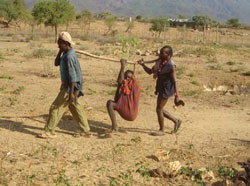8.4 Shared decision making
The key feature of the shared decision making process is a dialogue in which both client and practitioner share information, leading to a decision regarding the client’s healthcare. Shared decision making is based on trust, truthfulness and respect for the client’s choice. For this to be effective, good communication skills are crucial. If some decisions have to be made, for example about transfer to a hospital for further treatment, the patient might be concerned about their own issues, such as their values, religious and cultural beliefs and finances (Figure 8.3). For the Health Extension Practitioner, the discussion should include the risks and benefits of being transferred for better treatment as well as the likely outcome of no treatment. How information is shared, and what information is shared, may influence the patient’s choice. At an ethical level, there is a tension between client autonomy, beneficence and confidentiality that may not be easily resolved. Ethical conflicts, especially involving family members, should be anticipated in shared decision making.

Case Study 8.3 Managing your own decisions
Tadelech is a member of your local community. She is usually a strong woman who is a good mother to her seven children and an active member of the community. Recently she has become seriously ill with a chest infection that has turned into pneumonia. Although the Health Extension Practitioner, Hadas, has tried to convince her that she needs to go to hospital, Tadelech is determined to stay in her own home.
Hadas is in a difficult position. Of course Tadelech should be able to decide about her own health and her own body – this is the basic ethical value of autonomy. But the healthworker knows that without proper treatment she might die and then all Tadelech’s children would suffer. Indeed the whole community would lose one of their important members.
Which of the following actions do you think that it would be ethical and appropriate for Hadas to do? Explain your reasons.
- a.Do nothing and hope that Tadelech recovers from the pneumonia.
- b.Force Tadelech to go to the hospital by carrying her there against her will.
- c.Explain to Tadelech’s husband and parents about the serious nature of her chest infection and hope that they will be able to persuade her to take up the offer of hospital treatment.
- d.Ask for help from an experienced healthworker at the hospital or health centre.
Answer d. will always be appropriate if you are having problems with an ethical dilemma. Seeking the advice of someone more senior or more experienced is almost always helpful. But before seeking advice, answer c. would be well worth trying. Doing extra tasks in order to try to save a life (beneficence) is an ethical principle that is always worth pursuing. Using force, as in answer b., is not correct. This would certainly be against the ethical principle of autonomy. However ill the person is, they still have rights to decide about their own issues.
8.3 Privacy and confidentiality
